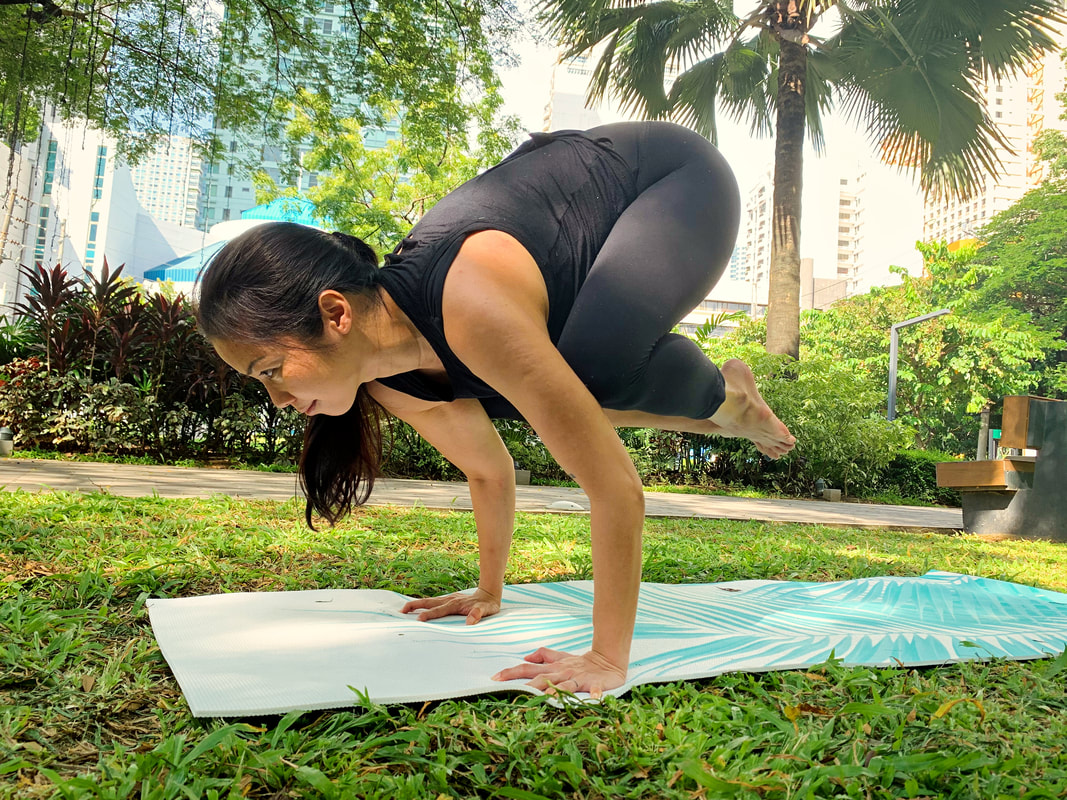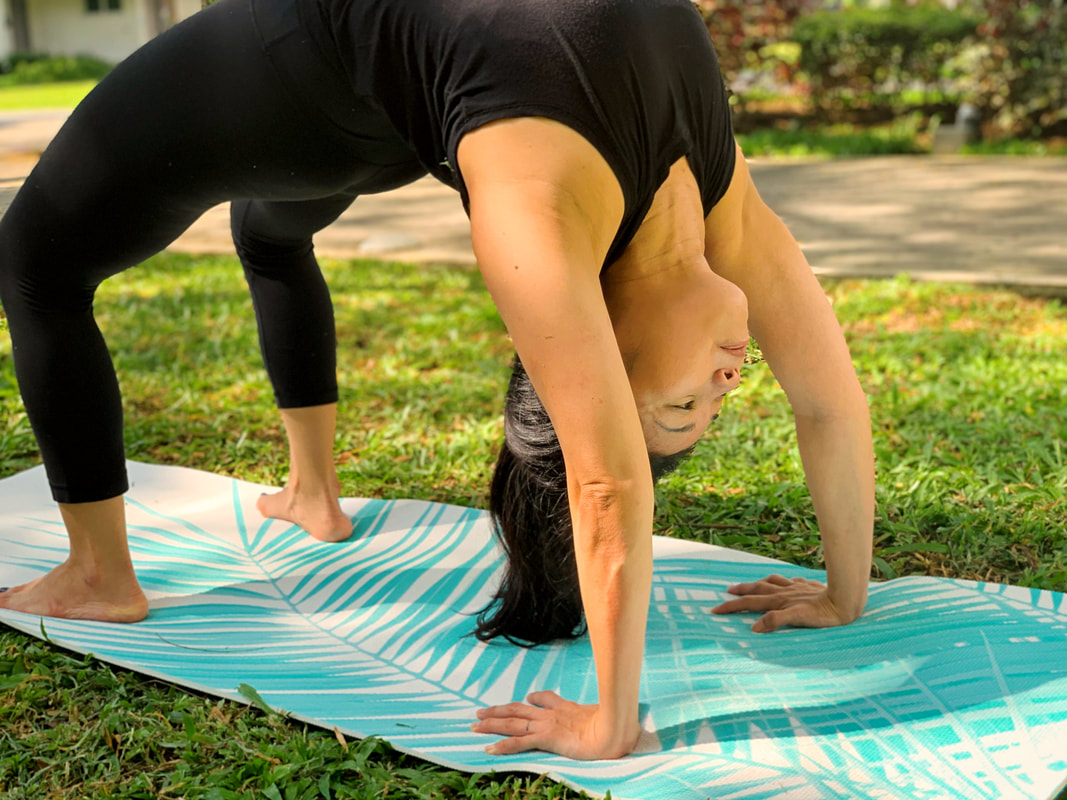Jivamukti Yoga ClassesJivamukti Yoga Classes are open-level classes that combine yoga philosophy, logically-sequenced yoga poses, meditation, spirituality, and introspection. This practice emphasizes that the liberation of our individual soul is tied to the liberation of all.
Read Google reviews here Read student testimonials here |
jiva means soul and mukti means liberation.
this mantra is at the core of jivamukti yoga:
Lokah samastah sukhino bhavantu
May all beings everywhere be happy and free, and may the thoughts, words, and actions of my own life
contribute in some way to that happiness and to that freedom for all.
contribute in some way to that happiness and to that freedom for all.
Studio Location:
Torre Yoga and Wellness
UG08 Cityland 10 Tower 1, 156 H.V. Dela Costa, Makati, Metro Manila, Philippines
Class Fees:
P650 for 1 class or P4,800 for 10 classes (3-student sharing)
Book via Rezerv
Torre Yoga and Wellness
UG08 Cityland 10 Tower 1, 156 H.V. Dela Costa, Makati, Metro Manila, Philippines
Class Fees:
P650 for 1 class or P4,800 for 10 classes (3-student sharing)
Book via Rezerv
frequently asked questions
Q: What is the format of a Jivamukti Open class?
A: A Jivamukti Open class includes a dharma talk (a talk on yoga philosophy), vinyasa-based yoga sequences, physical assists (students can opt in or opt out), guided relaxation, and meditation. The order of the elements may change but they are always present in a Jivamukti Open class. The physical part of the practice ensures that the spine is moved in all directions (forward, back, side, twist, upside down). The class is open to beginners as well as seasoned practitioners. Though the yoga sequence in a Jivamukti Open Class includes poses like headstand and upward facing bow, these are always optional and on a best-effort basis. Yoga is more than just physical poses, and we take on a beginners mind no matter how long we’ve been practicing.
Q: How is a Jivamukti Restore and Renew class different from a Jivamukti Open class?
A: A Jivamukti Restore and Renew class is a yin-based practice that is slower and targets connective issues instead of muscles. The sequence does not build up to a pose, but rather allows the body to prioritize passive stretching. The dharma talks and introspective elements are still present in a Jivamukti Restore and Renew class, though there are more silent moments as yin-based poses are held for 3-5 minutes at a time.
Q: What can I expect from Jivamukti Yoga classes that you teach?
A: The Jivamukti Yoga classes that I teach are heavy on the dharma or philosophical teachings. Apart from being taught in the beginning of the class, they are interweaved into some poses throughout the class as well. Your consent will be asked for hands-on assists to respect your boundaries. I aim for my classes to be safe and inclusive, especially for populations who experience systemic discrimination because of their gender, race, size, ability, class, etc. If my words or actions don’t match these intentions in or outside of class, I would welcome the opportunity to be corrected so I can serve yoga students better.
Q: Does Jivamukti Yoga conflict with my religion?
A: While yoga exists alongside Hinduism and has many parallel teachings, it is different from Hinduism and does not enforce any one religion upon its students. In Jivamukti Yoga, we include teachings from different spiritual traditions and different disciplines of study. If you are open to learn indiscriminately, you are likely to find that yogic teachings can expand your appreciation of your chosen religion. Ultimately, yoga teaches love and oneness, not dogma constrained by any one religion.
Q: Are the Jivamukti Yoga classes recorded?
A: I do not take photos or videos during classes, nor do I post anything on social media without students’ explicit consent. My priority as a teacher is to provide a space for you to go deep into your practice, both physically and emotionally, without having your private moments captured. I find that many students become concerned with appearance or performance when being recorded, and this interferes with the intention of fully showing up and taking time to look within. I may, however, take audio recordings of my voice to have an audio version of the class made available free to the public. This makes Jivamukti Yoga more accessible to a wider group of people, and breaks down the barrier of cost in some way.
Q: Do you have to be vegan to take a Jivamukti Yoga class?
A: You don't have to be vegan to take a Jivamukti Yoga class in the same way that you don't have to be able to do an arm balance to take a Jivamukti Yoga class. You are welcome as you are. That said, Jivamukti Yoga promotes veganism as a way to practice non-harming. Yoga, after all, means oneness, and that includes oneness with all beings we share this Earth with. Many Jivamukti Yoga students find that as their yoga practice deepens, they become naturally pulled into living in a way that is intentional and conscious. In Jivamukti Yoga, part of many talks, workshops, and trainings is how the ethical precepts of yoga (non-harming, non-stealing, truth, non-sexual exploitation, and non-greediness) support veganism. It is this foundation that makes a Jivamukti Yoga class inherently vegan in its values. Jivamukti Yoga co-founder Sharon Gannon has published a book entitled “Yoga and Veganism” that dives deep into this subject.
Q: Why do Jivamukti classes include controversial topics like politics, social justice, or climate change?
A: The ancient practice of yoga has never been neutral. Yoga philosophy emphasizes non-harming, and in the book Bhagavad Gita, one of the most important texts in yoga, the main character Arjuna is a warrior in the midst of a battle. We can decolonize our yoga practice by gaining the understanding that peace is not about evading difficult topics because our privilege allows us to, but about practicing non-harming in an active way. Not only do we refrain from causing harm, but we stop harm from happening. And if we cannot directly stop harm from happening, the least we can do is draw attention to the harm that is going on in the world around us. Furthermore, Jivamukti Yoga was co-founded by activists Sharon Gannon and David Life, and it is the intention of Jivamukti Yoga to bring activism back into the yoga practice. While politics, human rights, animal rights, and climate justice may be uncomfortable to talk about, these are necessary subjects to include in our sphere of interest if we want our yoga practice to be complete. To strive to be a jivanmukta (an enlightened soul living in a body), we understand that the our enlightenment is tied to the liberation of others.



